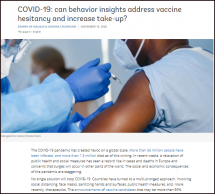COVID-19: Can Behavior Insights Address Vaccine Hesitancy and Increase Take-up?
In efforts to reduce infections by COVID-19, effective vaccines will only contribute to herd immunity if people accept them and follow the correct vaccination course. The take-up rate is a crucial variable to consider in the quest to achieve herd immunity.
For instance, with a 90% effective vaccine, we need a 77.7% take-up rate if the herd immunity threshold is 70%. Currently, the picture is mixed: in a global survey of potential acceptance of a COVID-19 vaccine, positive responses ranged from 55% in Russia to 87% in China. In September 2020, a Pew survey suggested that 49% of American adults would refuse a COVID-19 vaccine.
The behavioral science literature suggests the importance of understanding the underlying drivers of vaccine decision-making. Countries should design their strategies for vaccine take-up to target these factors, including the perceived risk of disease and side effects, social norms, costs in terms of time and effort, and trust in the health system and government. Behavior science offers options that go beyond traditional behavior change campaigns.
Last modified: January 4, 2021
Language: English

